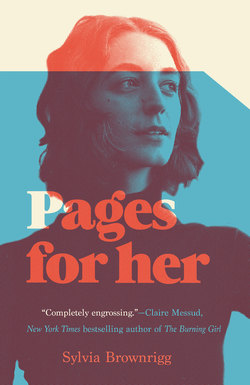Читать книгу Pages For Her - Sylvia Brownrigg - Страница 31
На сайте Литреса книга снята с продажи.
23
ОглавлениеFlannery had not completely lost sight of that auburn-haired beauty.
In previous eras a person might lose a love and then not know where she had gone or whether she were alive or dead – until a startling glimpse at a distant market place or town square, or singing hymns in church.
However, in the over-surveilled and close-circuited twenty-first century, former beloveds scarcely had room to vanish. It was easy to find people: their tracks were everywhere. Anne and Flannery, whose bond had been a thickly worded one, their short-lived love nest lined with books and papers, were both in professions that brought them in frequent contact with print.
Flannery knew she was going to be a writer long before Anne expressed skepticism that she could be. (‘Ah. You’re hoping to write?’ Anne had asked seventeen-year-old Flannery, to which Flannery had replied simply, ‘Not hoping to. I just do.’) As adults Anne and Flannery both were published, hired, connected to institutions. They were, as Californians put it, squarely on the grid.
Yet they had corresponded just twice, in twenty years.
When A Visit to Don Lennart was published, before the circus of appearances took over, Flannery received a postcard in an envelope. On one side, a Velásquez portrait of a plump, bearded man, The Buffoon Pablo de Valladolid; on the other, the familiar slanted hand. The envelope was addressed to Flannery, care of her publisher, and was sent from Anne’s university at the time, Emory. Flannery saw the envelope when it arrived in the tarnished brass mailbox in the East Village apartment she shared with Adele, and stood leaning against the scuffed wall on the ground floor, finding it hard, for a moment, to catch her breath.
Dear Flannery,
Might your Don look something like this absurd but oddly dignified Spanish gentleman? (I like your title’s nod to Sybille Bedford.) You always knew your stories would make their way into the world; and I learned early on that you were a person who could make her imaginings real. Congratulations on the publication of your book. I am pleased for the nation’s readers that they’re being given the chance to relish your voice at last, and have pages of yours to hold for themselves.
Anne
‘Pretentious,’ Adele judged tartly when Flannery showed the card to her. ‘Who does she think she is, God?’ (I might have made her think so, Flannery thought. It wasn’t her fault.) Adele had heard enough stories about the wonderful, remarkable Anne to last her a long while. Nonetheless, Adele’s judgement did not stop Flannery drafting dozens of replies to the postcard, in her head, on paper, on the computer. She pretzeled herself into knots one day at the Museum of Modern Art with the effort of selecting a postcard whose image would perfectly convey what she hoped to express (Cézanne landscape? Lovely, but bland. Warhol’s Marilyn? Trying too hard. Naked Picasso ladies? Suggestive, therefore tacky). The difficulty defeated Flannery, not least because she did not know what expression she was really after. No single image was ideal. No words worked, finally. All remained unsent.
A few years later, when Flannery had moved back to San Francisco, she heard from an old Yale friend that Anne had been hired, in a bit of university poaching, by NYU, and whisked away from Emory in Atlanta (along with, the friend helpfully added, her historian partner, Jasper Elliott). In the teacup of high-end academia, this had created a temporary storm. Still, Flannery knew New York was where Anne had always wanted and intended to be, and that the city deserved her. Taking a leaf from Anne’s book – Flannery had always been more likely in this relationship to imitate than initiate – she sent Anne a postcard, addressed from Flannery’s art college in San Francisco, to the department at NYU. Agonies again over an appropriate picture, but finally from a trip to LA she found a card of Diego Rivera’s Flower Carrier. With its dozen lilies and its faceless girl it was, Flannery hoped, not too devotional, but she made herself stop worrying and simply send it. Her words were sparse. It was more a gesture than an actual communication.
Dear Anne,
The city has you back. I’m happy for its university, and for you.
Unlike Anne, though, Flannery did stick her neck out. In writ-ing – where she had always located her greatest boldness.
She signed the card with –
Love.
